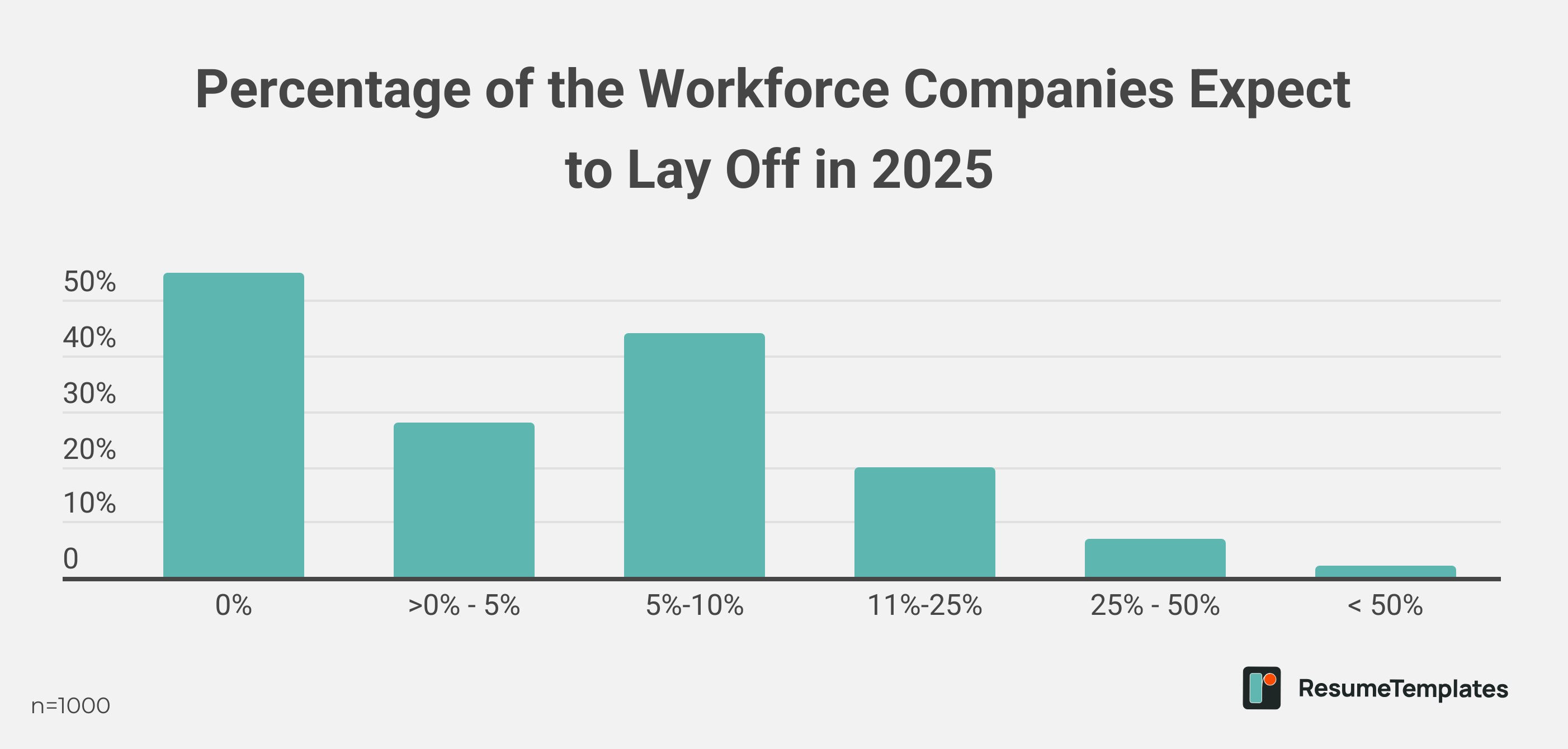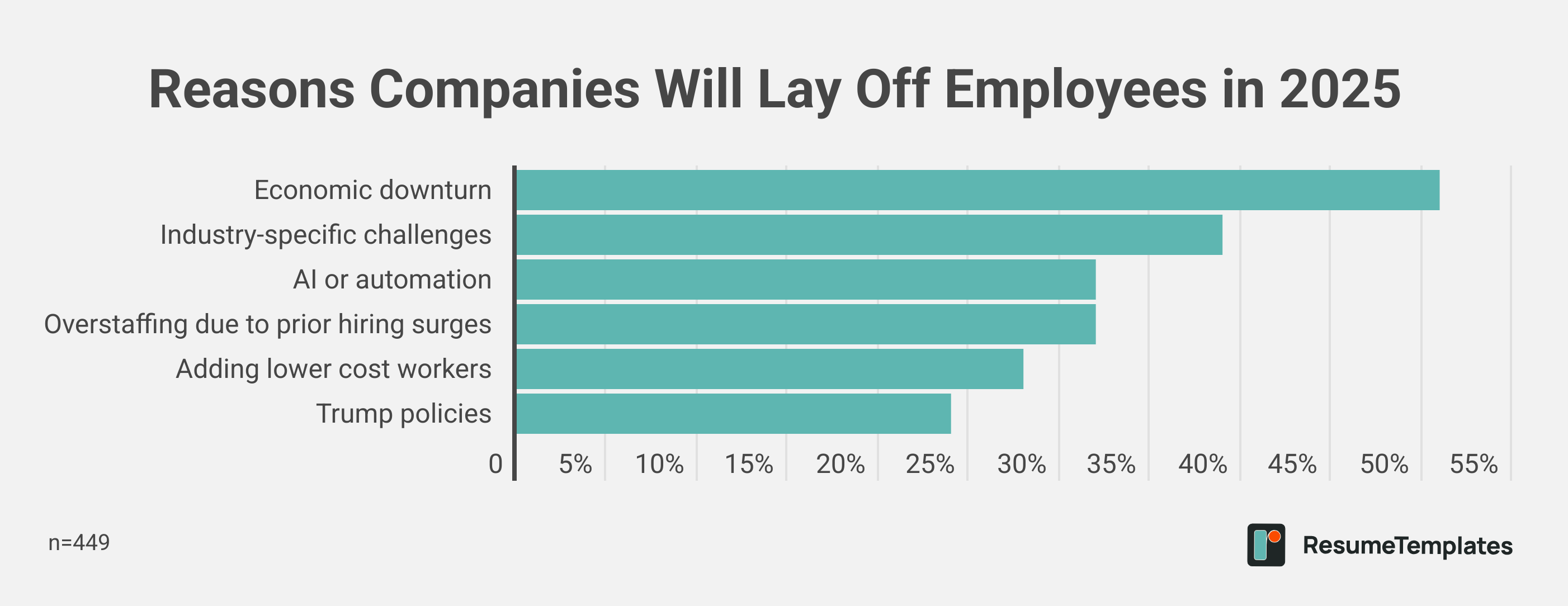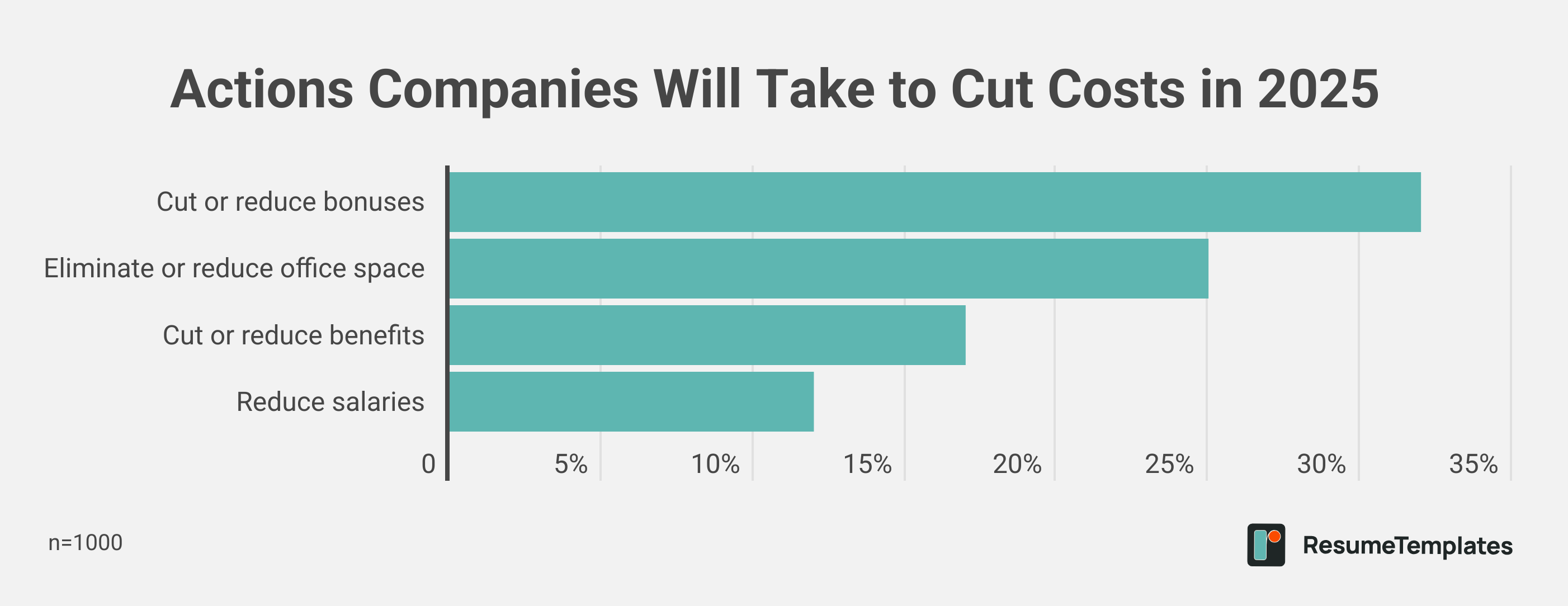ResumeTemplates surveyed 1,000 U.S. managers in January to understand how prevalent layoffs will be in 2025.
Study highlights:
- 45% of companies say they’re likely to lay off workers in 2025
- AI use and Trump policies are among reasons for layoffs
- 3 in 10 companies currently have a hiring freeze
- Companies also plan to cut costs by reducing salaries, benefits, and office space
45% of Companies Will Likely Lay Off Employees in 2025
Based on the responses to our survey, 11% of companies indicate they definitely will proceed with layoffs in 2025, while an additional 34% say they probably will. On the other hand, 39% of companies report they probably won’t lay off employees this year, and 16% are confident they definitely won’t.
Among companies anticipating layoffs, the scale of workforce reductions varies. Most expect relatively modest impacts, with 28% planning to lay off fewer than 5% of their workforce and 44% projecting layoffs between 5% and 10%. Larger layoffs are less common; 20% foresee reductions of 11% to 25%, and fewer than 8% anticipate cutting more than a quarter of their workforce.

1 in 10 cite incoming President Donald Trump’s policies as a reason for layoffs
Over half of companies (51%) cite an economic downturn as a driving force behind layoffs. Companies also cite industry-specific challenges (39%), AI and automation (32%), and overstaffing from prior hiring surges (32%). Additionally, 28% of respondents acknowledge that their intention to replace current employees with lower-cost workers is influencing their layoff plans, and 24% cite incoming President Donald Trump’s policies.

“Layoffs can be tricky because you never know if a company will use performance metrics, last in first out, or a percentage across the board to make decisions,” says Julia Toothacre, chief career strategist at ResumeTemplates. “There are multiple actions you can take to help protect yourself, but know that none of these are a guarantee. First, have a conversation with your manager to discuss the likelihood of layoffs impacting your position. Next, make sure you’re voicing your accomplishments to your manager and those with influence to ensure you’re someone the company can’t afford to lose. Finally, prepare yourself in case there is a layoff, which means updating your LinkedIn and resume to reflect your accomplishments.”
“If possible, keep tabs on the financials of the company and any information you can find that might tip you off to a layoff. If you work for a large organization, they are required to report any layoffs in advance to the WARN database, which you can look up,” Toothacre adds.
3 in 10 Companies Currently Have a Hiring Freeze
Nearly one-third (31%) of companies currently have a hiring freeze in place, and an additional 13% say they will definitely or probably implement one at some point this year.
Companies will cut salaries and benefits and reduce office space to reduce costs
When asked about cutting employee compensation and benefits or altering the amount of office real estate they have, many companies plan to use these tactics to cut costs. More specifically, 32% plan to reduce or cut bonuses, 25% will eliminate or reduce office space, 17% will cut or reduce benefits, and 12% plan to reduce employees’ salaries.

For companies reducing salaries, the cuts are expected to vary based on employee roles and performance. While 35% indicate that salary reductions will apply across the board, 30% say the focus will be on low-performing employees. Additionally, 19% will make cuts only at the executive-level, and 16% of companies plan to reduce pay for remote roles.
“Cutting salaries is never the right move for an organization, especially if it has recently done a round of layoffs. It’s also not a good look if that same company reported record profits, or if their executive teams are getting bonuses. For many professionals, a salary cut or reduction in benefits is a signal it’s time to leave. In some cases, companies might want people to quit so they can consolidate positions or rehire at a lower salary. Either way, salary cuts impact morale and will likely result in lost top talent,” says Toothacre.
“Reducing office space is a better plan that has minimal impact on the employee. Giving employees flexibility to come to the office or work remotely full-time is a better option than reducing salaries or benefits. Given the amount of return-to-office mandates we saw in 2024, I doubt this will be the solution, but it’s a good option to minimize layoffs.”
This survey was conducted in January 2025. It surveyed 1,000 U.S. managers in total. Appropriate respondents were found through demographic criteria and a screening question.
To take the survey, respondents had to be over 25 years old, have a household income of at least $75,000, and currently work at a company with more than 10 employees. Respondents also had to be in a manager-level position.
Resume Templates offers free, HR approved resume templates to help you create a professional resume in minutes. Choose from several template options and even pre-populate a resume from your profile.